This keto guide will tell you everything you need to know to start a keto diet. It will help you understand the benefits and possible side effects of keto, what to eat, troubleshooting, and more!
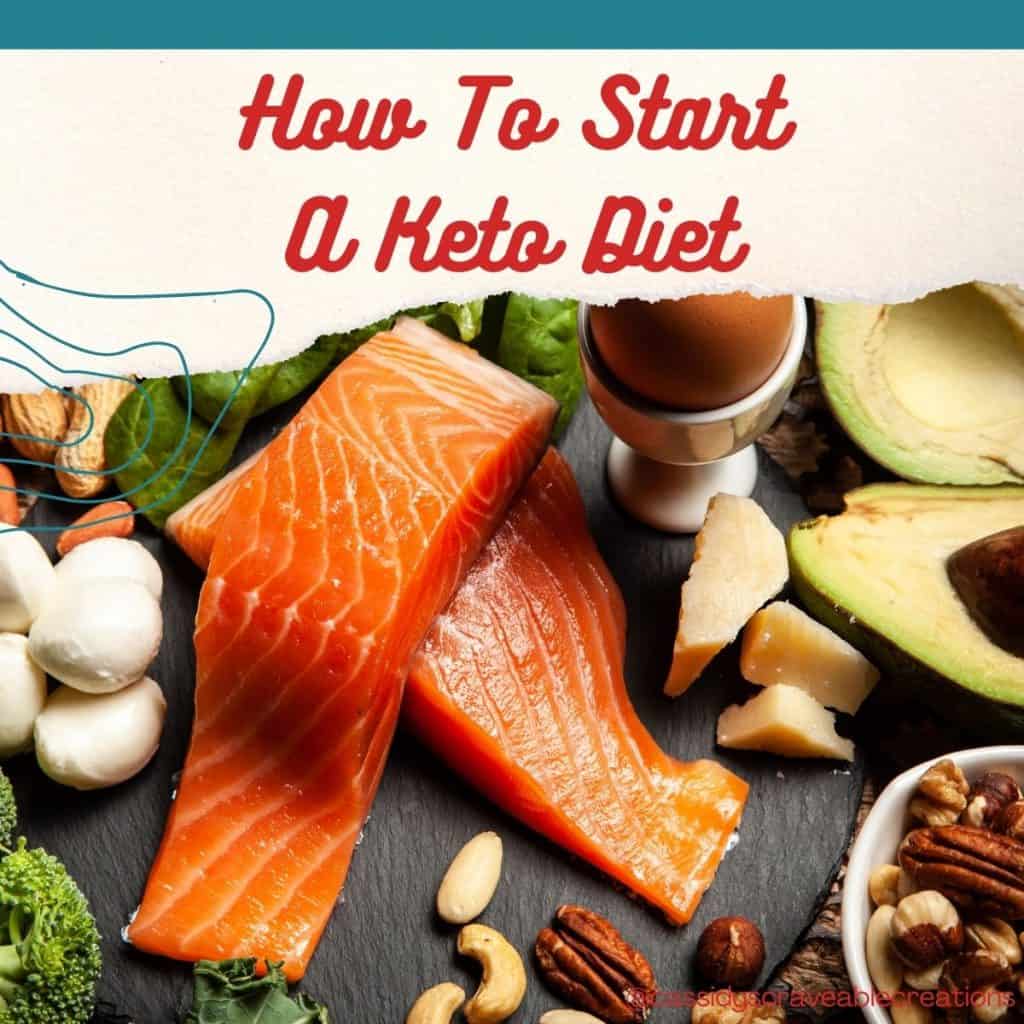
All of this information came from my Keto & Intermittent Fasting Coaching Course from Dr.Berg. This is for informational purposes only and is not intended to serve as a substitute for the consultation, diagnosis, and/or medical treatment of a qualified healthcare provider.
What is the keto diet and why follow it?
The Keto (or Ketogenic) diet is a low carb (or carbohydrate), moderate protein, high fat diet which puts your body into a nutritional state of ketosis.* This means that your body creates ketones and uses fat for energy instead of using glucose (or sugar) from carbs.
The average person runs their body on sugar fuel—very few people are actually burning fat. They’re losing water or muscle protein.
Fat in the body is used as a backup fuel source only when you starve your body of sugar (glucose).
Fat is not used unless there's no sugar available, which is why a low-carb diet, that isn’t starvation, will help you burn fat.
Sugar also increases insulin, and insulin is a hormone that keeps you from burning fat, and high insulin causes a host of health problems. Your body and your brain run very efficiently on fat and it's a very clean fuel to run on.
As mentioned earlier, burning fat for fuel is called ketosis. It can take 3 to 20 days to get into ketosis.
Following a healthy keto diet can help support:
- energy and focus
- healthy blood sugar regulation
- weight loss
- hormone regulation
- epilepsy
- brain/mood disorders
- problems with mental focus
- healthy cholesterol
- healthy triglycerides, and more!
We started following a keto diet to help with my son’s autism, epilepsy, and severe digestive problems. Almost immediately, however, we noticed that it was helping our entire family - we were hooked!
How do you get into ketosis?
Limiting carbs is the backbone of a keto diet and is how you get into ketosis. You have to starve your body of carbs (sugar) for your body to switch over to using fat for fuel instead of glucose.
To do this, you'll need to eat around 30 net carbs per day. The healthier and more fit you are, typically, the more carbs you can handle.
For an in-depth video on this, be sure to watch my Patreon video, Getting Into Ketosis!
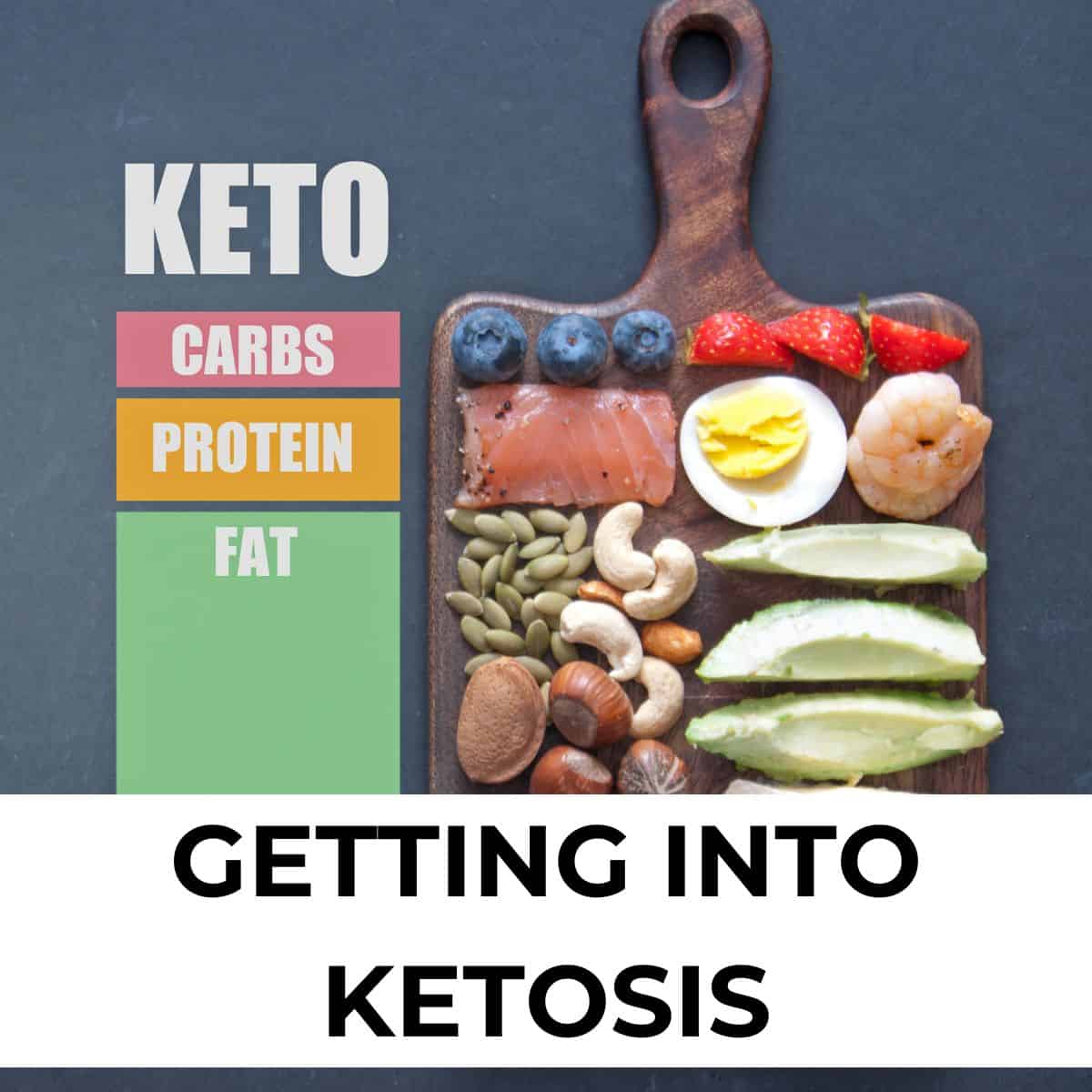
In the video, I talk about:
- How to get into ketosis (obviously 🤣)
- How to find the perfect macros for your body.
- The correct way to count net carbs with all the new keto products on the market.
- If you need to count calories.
- Foods to avoid, even if they are 0-carb!
- My #1 tip for staying on track.
- How long it typically takes to get into ketosis.
- The scoop on nuts.
- How many vegetables you need to be eating.
- And so much more!
I recommend carbs from healthy sources, such as hummus, berries, nuts, and seeds. I don't recommend sugary carbs or grains.
If you want more information on how many carbs are in various foods, please see my Guide To Carbs In Common Foods post!
I also recommend eating around 70% fat, 10% carbs, and 20% protein, with about half of your carbs coming from veggies (7-10 cups a day). Why?
Because as you go into ketosis, fat is going to be coming out of your body. And if you don't have enough vegetables, your liver will have trouble processing all the fat.
You also need a lot of potassium (4700 mg a day!), which vegetables can help provide. Along with magnesium and other vital vitamins and minerals.
To figure out your specific macros for your body (carbs, protein, and fat), please see my Macro Calculator.
What are net carbs?
Digestible carbs break down into sugar (or glucose) in your body which will raise blood sugar and affect insulin levels.
Fiber and sugar alcohol are the only kind of carbs that aren't digested, so is therefore not converted to sugar.
For this reason, net carbs = total carbs - fiber - sugar alcohol.
Protein
Many people get Atkins confused with Keto. While both reduce carbs, the Atkins diet allows unlimited meat while the Keto diet is mostly focused on fats with only moderate amounts of meat and protein.
While protein is very important for your body, you want to be careful not to eat too much. Too much protein can be hard on your body, make you not feel well, and cause an insulin spike.
As a general rule of thumb, protein should be about ¼ of your plate, roughly 3 to 6 oz. per meal.
I highly recommend grass-fed beef and wild-caught fish because they contain nutrients your body needs that the conventional varieties don't contain.
Dairy
While dairy is allowed on Keto, many people (including myself) choose to follow a keto diet with little to no dairy since conventional dairy can be very inflammatory and many people are sensitive to it.
Following a dairy-free Keto diet has become super popular. If you do eat dairy, I recommend eating grass-fed dairy because it contains nutrients that conventional dairy just doesn't have.
Plus, many people who are sensitive to dairy do fine with grass-fed dairy - especially grass-fed butter.
In fact, the only dairy I consume on a regular basis is grass-fed butter.
I like grass-fed butter because it has many health benefits, such as vitamin K-2 (which is good for your arteries!), many anti-inflammatory properties, and healthy fats.
It also tastes about 1000 times better!
Fat
After the low-fat craze of the '80's many people are still scared of eating fat. But not all fats are bad, in fact, some are extremely healthy!
Healthy fats help with vitamin and mineral absorption, brain function, blood sugar, blood pressure, and triglyceride levels.
Healthy fats also help with healthy cholesterol levels! For more information on this see the post: Does Eating Fat Raise Cholesterol?
On the keto diet, fat is our source of energy as well as what makes us feel full and satisfied. Keep in mind, though, that fat is like a lever.
While carbs and protein stay the same, you will increase or decrease the fat to gain or lose weight, respectively. So if your goal is to lose weight, only eat enough fat to feel satisfied, and don't try to meet a specific goal.
Some examples of good fat include:
- coconut oil
- nuts and seeds
- avocados
- eggs
- chia seeds
- flax seeds
- fatty fish
- extra virgin olive oil
- organic and grass-fed meat
- grass-fed dairy (if you tolerate dairy)
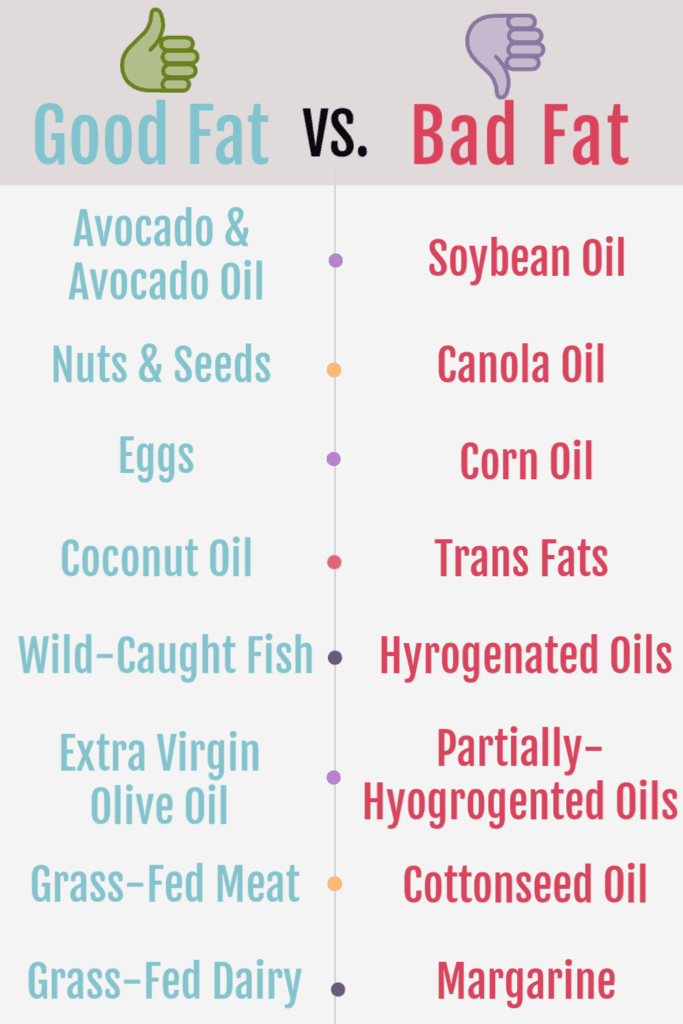
I would stay away from seed oils (such as soybean and cottonseed) along with all the fats in the "bad fat" column because they're generally unhealthy and highly inflammatory.
And if weight loss is your goal, it's extremely difficult to lose weight when your body is in a state of inflammation.
One of my favorite ways to fill up on healthy fats is with fat bombs! Here's a roundup of my very favorite fat-bomb recipes.
Grains
Grains raise blood sugar as much as table sugar, so are not recommended on a keto diet. They include foods such as flour, bread, pasta, and cereal.
There are also a few other problems with grains, even whole grains:
- To be considered whole grain, a grain actually only has to be 50% whole grain. Therefore, most "whole grain" products have been ground down, exposed to oxygen, stripped of nutrition, and not soaked. Therefore, modern grains are completely different than the grains our ancestors used to eat. Plus, many "whole grain" products have added sugar and chemicals - despite saying "heart healthy".
- Refined grains have been stripped of nutrition leaving only the carbs. Then, they are enriched with synthetic vitamins and minerals, which aren't easily used by the body.
- They are high in omega-6 and can create a lot of inflammation.
I know bread can be SO hard to give up! So if you're craving some carby goodness, see my keto bread recipes!
Frequency of eating
Every time you eat, you trigger insulin, at least to some degree. This is why I recommend intermittent fasting.
By simply cutting out the snacks between meals, you will help your body 'clean house', lose weight, and support healthy insulin levels.
After that, you can experiment with trying to go longer without eating, eventually going down to 2 meals a day, if possible.
If you have a hard time going from meal to meal without snacking, be sure to
- Eat enough fat to keep you full until the next meal. It will keep you satisfied and won't spike insulin.
- Keep your carbs low. Too many carbs will spike insulin, make you hungrier, and will slow your metabolism.
Benefits of the keto diet
You feel full for longer
Fats burn slower than carbs do. This means that eating a high-fat low-carb diet will result in overall reduced hunger, making it easier to control cravings and lose weight.
Neurological benefits and mental clarity
Keto can be used as a natural treatment for neurological disorders. In fact, the Keto diet was initially invented as a way to control seizures in children!
When the brain switches from using glucose to fat as a source of energy the body starts to produce ketones, which in turn can help with brain function.
It can help with attention, focus, mood, memory, cognitive ability, and more!
Stable blood sugar
Following a Keto diet helps you get off of the blood sugar roller coaster. Instead of getting a sugar high after eating carbs then crashing, only to look for another sugar high, eating low-carb and high-fat results in more normalized blood sugar levels. For more information on this, see my insulin resistance post!
Weight loss
Eating high-fat low-carb helps with insulin sensitivity. Insulin sensitivity is the opposite of insulin resistance, which is linked to weight gain.
Keto also helps control hunger and eliminates sugary sodas, cookies, breads, and the like - which contribute to weight loss.
If you find you're having trouble losing weight on Keto, there may be a few culprits:
- You're eating too much fat. If you find you're not losing weight, you may be burning the dietary fat that you eat and not burning body fat. Only eat enough fat to feel satisfied.
- High insulin levels. Eating is one of the primary triggers of insulin. If you frequently snack or eat throughout the day, this will cause chronic sustained higher levels of insulin. To help with this, only eat 3 meals a day with NO SNACKING. If you have a hard time with this, try to incorporate more fat at each meal.
- You're eating more carbs than you realize. Be sure to track your macros to make sure your not eating hidden carbs.
- Excessive Exercise And Stress. Excessive exercise and high levels of stress can increase cortisol levels. Excess cortisol levels can cause weight gain (especially around the tummy!) and keep your brain from getting the energy it needs.
Balanced blood work
If you're eating more carbs than are needed for energy - regardless if they come from “healthy” carbs or “junk food” carbs – they are stored in the body as glycogen, and eventually, as triglycerides.
High triglyceride levels are associated with many health problems such as high blood pressure, diabetes, and obesity. This provides me with an added reason not to over-feed my family with carbs - even if they are healthy!
Eating a low-carb diet also helps promote healthy cholesterol!
Less cravings
Typically, the keto diet helps you regulate blood sugar and squash cravings. However, if find yourself still craving sweets, there may be a few culprits:
Not enough potassium: Potassium helps store sugar and get rid of cravings. If you’re craving sugar, you may not be burning fat, but instead burning sugar!
As mentioned earlier, your body needs a whopping 4700 mg of potassium a day - that's 11 bananas or 5 avocados! Potassium can be hard to find, but dark leafy greens can help provide the needed amount.
Not enough bile: Bile helps you feel satisfied. When some people consume food, they feel they need something sweet.
This can mean that they’re deficient in bile and cannot break down fats to satisfy the brain. Try Gall Bladder Formula to feel more satisfied when you eat.
Possible side effects
When you transition from burning sugar to burning fat, your body literally has to create new mechanisms to burn fat instead of sugar. This can take anywhere from several days to several weeks!
Because of this, here are some possible temporary side effects you may have while adjusting to a low-carb diet along with what can help:
- Fatigue - Take potassium powder (or get more through veggies).
- Keto Flu - Symptoms can include foggy brain, shakiness, fatigue, cramping, nausea, muscle pains, and the like. Take B vitamins and potassium (or get more through veggies).
- Keto Rash - This can happen during autophagy when your body starts 'cleaning house' and stirs up an immune reaction. Bentonite clay, increasing veggies, and B vitamins can help with this.
- Constipation - Either increase vegetable intake or decrease any vegetables you are not used to eating (such as kale or broccoli) that may be causing this. You can also increase potassium.
- Gout - This is due to increased uric acid. You can decrease protein and increase your lemon juice and potassium.
- Bad Breath - This is caused by eating too much protein. If you start to have metallic/fruity breath, reduce your protein intake.
- Hair Loss - You're not eating enough calories. Increase your calorie intake and increase B vitamins and trace minerals.
- Bloating - You're eating too much fat or having trouble digesting it. Reduce the fat and/or take gallbladder support.
- Leg Cramps - You need more potassium and electrolytes.
- High Cholesterol - This is cholesterol coming out of your fat cells as you lose weight and is temporary.
What if I don't have a gallbladder or I have an upset stomach?
If you don't have a gallbladder or have an upset stomach (such as nausea, bloating, burping, right shoulder pain, etc.), cut back on the amount of fat you are eating.
You'll need to start slowly to give your body time to adjust.
If you need, bile salts can greatly help with digestion, along with B vitamins and a good digestive enzyme.
I personally love Dr. Berg's Gallbladder Support to help digest fat - even if you don't have a gallbladder!
Keto recipes
If you're just starting out on keto, I highly recommend meal planning, it's a lifesaver!
And don't forget to browse all of my keto recipes and add them to your meal plans!
*Nutritional ketosis is not the same as diabetic ketoacidosis, which is a dangerous condition that results in extremely high ketone and blood sugar levels. A person with a normally functioning pancreas would not be at risk for ketoacidosis.


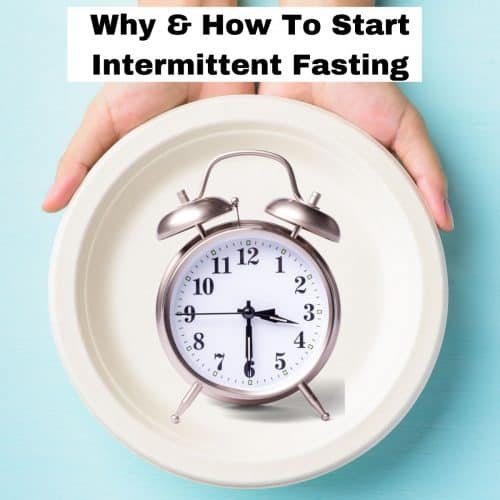
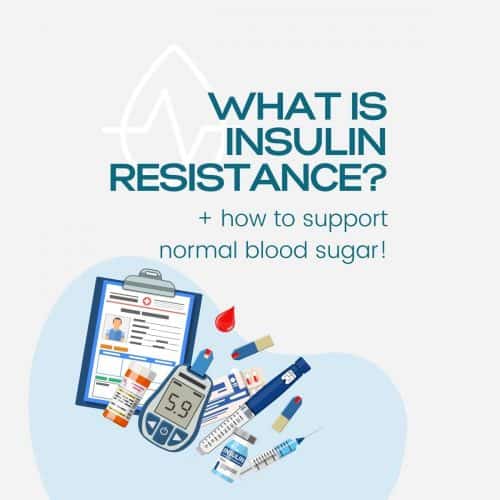
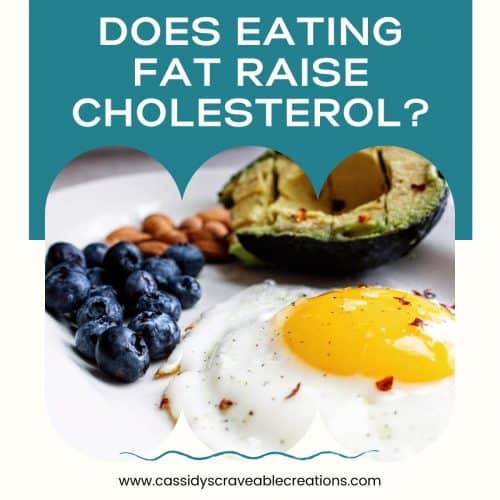
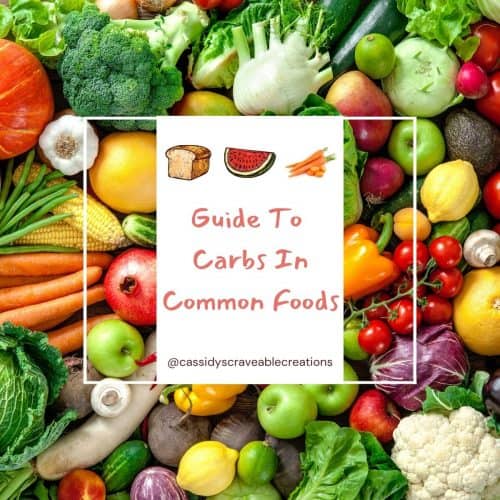
Comments
No Comments